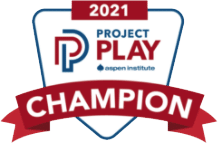
As a club, we need a process to help us create the best environments for player development. The process should be clear and should help the coach create a truly player-centered environment. At Colorado Rapids Youth Soccer Club (CRYSC), we’re committed to providing an exceptional soccer experience that fosters not only skill development but also a lifelong love for the game. Our approach to training is rooted in the belief that children learn best through engaging, game-like activities that emphasize enjoyment, participation, and personal growth. This philosophy is a cornerstone of our Technical Plan, “One Club, One Community,” which guides our coaches in creating player-centered environments across all regions and ability levels.
Our Philosophy on Learning and Teaching
- Reality-Based: Using the game as the starting point to develop perception, decision-making, and execution.
- Holistic: Promoting health, emotional, and social well-being, developing attitudes and social skills, and connecting all areas of development.
- Experiential: Learning starts from the player’s experience, utilizing analysis and reflection.
- Autonomy Support: Providing opportunities for players to take initiative, make decisions, and take ownership of their learning.
Our Player Development Philosophy
Our player development philosophy incorporates other key club beliefs. Striving to always keep the player at the center of everything we do, our player development philosophy will influence the methodologies that we use in terms of both coaching and training.
“Children learn and develop to their full potential through game-like experiences in an enjoyable environment that supports individual growth.”
Why a Games-Based Approach?
We believe that sport can teach valuable life skills such as teamwork, communication, discipline, perseverance, accountability, and the ability to overcome adversity.
The core principle driving our Games-Based methodology is the understanding that children learn and develop most effectively through game-like experiences in a fun, supportive environment that fosters individual growth. This stems from the recognition that traditional methods involving lines, drills, and lectures often fail to capture children’s interest or address their fundamental needs. We strive to develop remarkable coaches who emphasize the importance of creating practice environments that resonate with what players genuinely want: enjoyment, connection with teammates, and engaging, enjoyable activities.
Sport is a powerful tool for social development, offering a platform for learning, entertainment, and connection that transcends boundaries and enriches lives.
Key Learning Outcomes for Players:
- Intrinsic Motivation: Players learn what they like, tapping into intrinsic motivation as the primary driver for learning. Players always ask, “Coach, are we going to scrimmage?”
- Transferable Skills: They learn what they need, ensuring a seamless transfer of skills from training to the game, eliminating the disconnect often seen in traditional methods.
- Analytical Skills: The games-based approach helps players read, analyze, and decide, enhancing their ability to perceive and explain game situations, which in turn drives their behavior. Our #1 Key Quality is Game Understanding.
- Creative Problem-Solving: The methodology encourages players to be creative and seek their own solutions.
- Reflection and Experience: The games-based approach promotes player reflection on their experiences and how to use those experiences to improve.
- Independent Learning Habits: It fosters the development of independent learning habits when supported by the coach to encourage (mutual) reflection.
- Critical Thinking: Players evolve into independent, critical thinkers who are socially responsible and accountable adults.
Key Learning Outcomes for Players:
The adoption of the games-based approach aligns with research on athlete development pathways, aiming to maximize player enjoyment, intrinsic motivation, and skill development. The primary purpose is to immerse players in activities and game-like situations that focus them on the training goal, promoting conscious learning through fun, active involvement, repetition, and appropriate challenges. Consider it “deliberate play and practice” that involve game-like decision making and (collective) problem-solving skills.
- Deliberate Play:
- Creating an engaging and enjoyable environment is crucial for long-term motivation and learning.
- “Deliberate play” contextualizes the development of technique and tactical awareness.
- The game/environment serves as the primary teacher, with the coach facilitating and guiding players to find solutions.
- Benefits of Deliberate Play:
- Increased enjoyment and intrinsic motivation
- Enhanced game awareness
- Contextualized technical development (skills under pressure)
- Practice Activities:
- Activities should be player-centered and game-like, providing opportunities for instructional feedback.
- The goal is to develop the player in relation to the practice objective, team tactical principles, and key qualities.
- Players engage in various learning activities, such as game forms that can be modified to elicit certain behaviors and decisions.
The Role of the Coach:
The coach is an environmental architect who facilitates learning by creating realistic problems and encouraging players to co-create solutions. They should:
- Encourage collaboration and support mutual reflection to guide players in reflecting on game situations to make their actions more effective.
- Be patient and provide opportunities for learning, using cues and key words to maintain focus.
- Create a safe, enjoyable, and challenging environment that promotes decision-making.
- Use an inquiry-based approach to foster curiosity and critical thinking.
- Challenge and stimulate players to create solutions, using a blend of interactions.
By carefully balancing ‘deliberate play’, structured activities, and regular game opportunities, CRYSC aims to maximize player enjoyment and development. This holistic, player-centered approach ensures that each player’s unique needs are met, fostering a lifelong love for the game and promoting well-rounded development both on and off the field.
What Does This Look Like in Practice?
Our coaches are trained to design sessions that incorporate game-like scenarios, modified games, and activities that promote problem-solving and decision-making. The goal is to create fun, meaningful experiences that help players work towards their goals and then support the players’ reflection. Instead of traditional drills, players might participate in small-sided games that mimic real match situations, encouraging them to apply their skills in a dynamic and engaging way. Coaches will provide encouragement and support: Coaches should encourage players to take risks, try new things, and view mistakes as part of the learning process. Providing constructive feedback rather than harsh criticism helps create a nurturing environment.
Benefits for Players
- Enhanced Skill Development: Game-based training allows players to develop technical skills and tactical understanding in a realistic and engaging context.
- Increased Motivation: By making learning fun and enjoyable, we keep players motivated and eager to improve.
- Improved Decision-Making: Game-like scenarios challenge players to think critically and make quick decisions, preparing them for the demands of real matches.
- Stronger Teamwork: Many games emphasize collaboration and communication, fostering a sense of camaraderie and teamwork among players.
- A Lifelong Love for the Game: Ultimately, our goal is to instill a passion for soccer that extends beyond the field, encouraging players to continue their development and enjoyment of the sport for years to come.
Supporting Our Coaches
Parents should become familiar with our games-based approach that encourages children to have fun, connect with teammates, and learn through engaging and enjoyable activites. Furthermore, we should strive to understand the evidence-based approach to coaching that has been proven to develop players by integrating research, coaching expertise, and the needs and values of the player. By actively engaging in these supportive behaviors lised below, parents can create a strong partnership with the coach, contributing to a positive and developmentally appropriate soccer experience for their child.
- Parents can develop an understanding that the CRYSC methodology prioritizes the individual needs of each player to have fun, develop, and learn.
- They can support the coach’s efforts to create a positive and inclusive environment where players feel safe, valued, and motivated.
- Parents can become familiar with the coaching and training methodologies which include our emphasis on game-like activities, inquiry-based coaching, and autonomy support
- Parents can encourage teamwork and positive relationships among players. They should refrain from engaging in gossip or negativity that could undermine team cohesion.
- Parents can set realistic expectations for their child’s development and avoid placing undue pressure on them. We can understand that player development is a long-term process that requires patience and support
Get Involved!
We encourage all club members to embrace our games-based approach and support our coaches in their efforts to create engaging and effective training sessions. Talk to your child’s coach about their training methods, attend club workshops or upcoming U.S. Soccer Coaching Courses, and share your feedback to help us continuously improve.
Conclusion
At CRYSC, we’re committed to providing a soccer experience that is both fun and developmental. By embracing a games-based approach, we empower our players to reach their full potential, both on and off the field.
Colorado Rapids Youth Soccer Club (CRYSC) serves approximately 10,000 players ages three through 19, beginner to elite, in year-round leagues, camps, and tournaments. As a recognized 501(c)(3) nonprofit organization, CRYSC has been named a top 15 youth soccer club in the U.S. by Soccerwire and the top youth soccer club in Colorado by Colorado Parent Magazine. CRYSC’s mission is to provide an environment where young soccer players from diverse backgrounds are guided and inspired to reach their full potential, both on and off the field.









